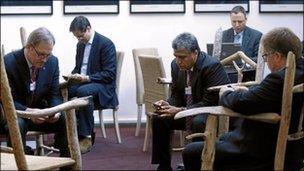Davos 2011: We're all hyper-connected, now what?
- Published

We're not just connected now, we're hyper-connected: superfast, always-on, and on the move.
And if the technology and business leaders at the World Economic Forum have got it right, the impact of this development will be far deeper than most of us imagine.
For starters, forget about PCs. For every desktop computer, there are 10 mobile devices. Around the world, mobile phones outnumber toothbrushes two-to-one.
These devices generate data, and this firehose of information is aimed straight at us, and change the way we live, work, learn and make money.
"Hyper-connectivity will change every business model and supply chain; it's at an inflection point this year... and the uptake of connectivity is accelerating ever more," says the boss of one of the companies powering the internet (under Davos rules I can't quote people speaking in closed sessions).
Another chief executive, Leo Apotheker at computer giant Hewlett Packard, calls it "the biggest revolution in information technology".
Technology shock
Ask any company boss here in Davos, and they will confirm that the real-time flow of data has brought "incredible productivity gains."
It also works at home. Connectivity is making us more powerful shoppers. We can watch the films that we want, when we want them. It connects us better to our networks of friends.
"There was a time when no one lived more than five miles away from their parents. Now we live all over the place, but for the first time [social networks] allow grandparents to see the activities of their grandchildren in real time," says a top executive working for a well-know social network.
But connectivity can have its drawbacks.
Information overflow, the "abundant distractions of the internet" can change our cognitive abilities. It may be a generational thing, though.
The chairman of a multi-billion dollar company tells the story of how he was "watching a movie with my kids, and they were both sitting there and at the same time chatting with their friends on the web".
"I asked them whether they still get the movie, and they said yes. Well, I don't the get movie, I said, with you chatting online," the executive continued.
"When the railroads were built, there were people who argued that humans would suffer brain damage from seeing the landscape rush by so fast, and I ask myself, am I one of them."
Upon which the executive from the social network leaned over and said mock-soothingly: "yes you are, but it's ok."
'You must be really old'
With information in abundance, it takes on a different value for the multi-tasking, self-organising "Net generation".
One top politician at Davos tells the story of how she visited a technology bootcamp for teenagers, and was stunned when the youngsters freely swapped computer code with competitors. When she challenged one of them, he said "you must be really old" and told her that the swap would make both projects better.
She later learned that the teenager had four patents to his name, and was on his second start-up.
At a less ambitious level, hyper-connectivity turns us all into information sharers. Even schools will have to understand that learning has to become collaboration, argued one executive.
Losing control
This does not stop at the factory gate or office door. Employees want to share and receive work information as easily as on Facebook - both inside the company and with the outside world.
Each of them can have as loud a voice as the chief executive or the head of communications.
Not every boss finds this easy to swallow: they used to be in charge of the message, but are losing control.
In the wider world, it means that companies can't control their brands anymore. At best, they shape them. Not by telling customers what to think, but through respectful interaction.
Without it, your reputation can evaporate in an instant. On the upside, the digital world allows companies to connect with their customer like never before.
Crisis mode
Hyper-connectivity also puts the news cycle into hyperdrive.
What to do then when a crisis hits? When the oil spills, the product is tainted, data get lost?
At best, a company has 12 hours to get a credible story across to the public, advises an executive whose company recently suffered a major crisis.
And be consistent, another chimes in. In the connected world, "there are more opportunities than ever to be caught out as a hypocrite; you have to be authentic".
"Treat your employees with respect and stick to your values," advises another.
Here comes the flood
Still, humans could drown in this data flood - although the bosses of tech firms promises that technology is here to help.
On financial markets, "pricing engines" and "bots" trade with each other, "with the pace of interaction so great, that a human can no longer pretend to be the consumer at the other end," says one executive whose company helps to make it happen.
Companies will have to use business analytics to process these masses of data and turn them into usable information, says Kris Gopalakrishnan, the chief executive of IT services Infosys.
In return they will gain insights into their company's operations and their customers like never before.
Thinking space
But hold on, several participants asked. "Where is the time for reflection," asked a politician.
There is no "space for policy making, for the quality of decision making," warned the boss of a multinational media company who acknowledged that while 24/7 connectivity had been great for his business.
"What if there is no privacy, no thinking space," he asked.
And indeed, while Davos is supposed to be a place for learning, discussion and reflection, one can't overlook the fact that in nearly every session at least a dozen participants surreptitiously or openly use their smartphones, laptops or tablets.
They are hyper-powered, and hyper-connected.
- Published29 January 2010